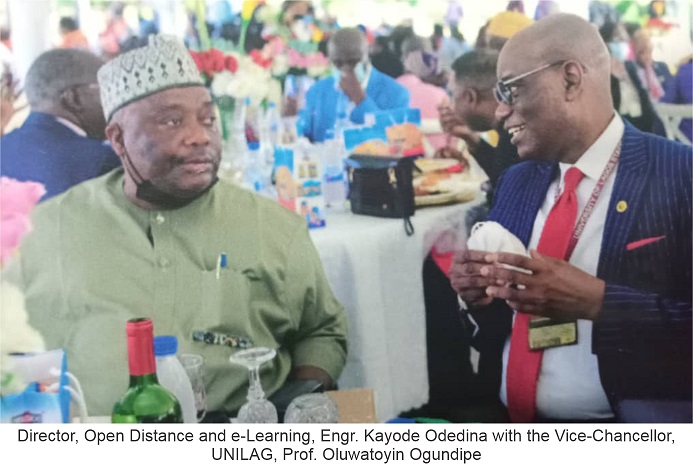
The Executive Secretary, National Universities Commission (NUC), Prof. Abubakar Adamu Rasheed, Mni, MFR, FNAL, has harped on the need to expand access to higher education using the Open Distance and e-Learning (ODeL) system, stressing that this mode of providing education also promoted life-long learning.
He spoke through the NUC Director, Open Distance and e-Learning, in his paper on “Government Response to Resilient and Inclusive Education through Open Distance & e-Learning,” at an International Colloquium hosted by the University of Lagos (UNILAG) Distance Learning Institute (DLI, recently at the University’s Nurudeen Alao Auditorium, with the theme “Recalibrating Open Distance Education and E-learning For Resilient and Inclusive Education.”
Prof. Rasheed postulated, among other things, that:
- Contemporary challenges e.g. insecurity, pandemic etc. have made ODeL mode of delivering education imperative.
- The unique features of flexibility of time, place, mode and access in the ODeL mode of delivery will ensure that learning and teaching take place irrespective of the happenings in an environment.
- The Access (Inclusiveness) must come with quality (Resilience) i.e. the access must be regulated.
He explained that, in view of all this, the Federal Government of Nigeria had developed policy frameworks to ensure an efficient and robust delivery of a quality, but accessible university education through ODEL. According to him, among these policies include the ‘Guidelines on Open and Distance Learning in Nigerian Universities’ and the ‘Steps and Procedure for Establishing a Distance Learning Centre.’
Prof. Rasheed reminded his audience that, although, there were various models of distance education, the Federal Government had however, adopted the ICT-Enabled Supported Blended Learning (IESBL) Model that was characterized by some features such as: centrality of learning materials; learning materials in mixed media format; deployment of “appropriate” technology; face-to-face component; robust learner support; formative & summative assessment as well as timely and meaningful feedback.
The Executive Secretary explained that the Commission is currently fine tuning the guidelines for both the adoption of e-learning and the establishment of private open universities in Nigeria for release to the public.
The Executive Secretary concluded by informing the gathering that the blended mode had continued to gain momentum in the Nigerian University System (NUS), which now boasted of 15 degree awarding distance learning institutions (NOUN and 14 dual mode universities) with the latest being the University of Ilorin Distance and e-Learning Centre.
In his remarks, the Vice-Chancellor, (UNILAG) Prof Oluwatoyin T. Ogundipe, FAS, gave credence to the activities of the university in incorporating e-learning into its mode of teaching. He stated that the topic came at the right time, as UNILAG recently conducted online Post-Unified Tertiary Matriculation Examination (UTME) for over 20,000 students.
The Keynote address was virtually delivered by Dr. Neil Fassina, President International Council of Distance Education (ICDE).
The occasion was chaired by Prof Patrick O.Utomi, Founder/ CEO, Centre for Values in Leadership (CVL) who encouraged all to not look at technology, but look at learning and see technology as a facilitator.
The colloquium was put together by the staff of Distance Learning Institute ably led by the Director of the Institute, Prof. Uchenna Udeani. The panel discussion was moderated by Mrs. Eugenia Abu, a veteran broadcast journalist.
The panel discussion comprised of renowned professionals, including the following personalities: Emeritus Professor Olu Jegede, of the National Open University of Nigeria, Abuja, who spoke on the “Emerging Landscape for Open Distance and e-Learning.”; Prof. Moeketsi Letseka, of the UNESCO Chair on Open Distance Learning, University of South Africa (UNISA), spoke on “Social Justice System and Accessing Resilient and Inclusive Education through Open Distance and e-Learning”; and Prof. Yemisi Obashoro-John, of the Department of Adult Education, University of Lagos, Akoka, spoke on “Inclusive Education in Open Distance and e-Learning”.
Others at the vent were Dr. Akanimo Odon, Africa Strategy Adviser, Lancaster University, United Kingdom, spoke on “Youth Engagement: Understanding Career growth and Resilience in the New Era.”; and Dame Pauline K. Tallen, OFR, KSG, the Honourable Minister of Women Affairs, who was ably represented at the colloquium by Mr. Idris Mohammed, Director of Economic Services in her Ministry.
Meanwhile, at the International Colloquium, stakeholders reiterated that the future of global education remained Open Distance and e-learning and urged all hands to be on deck to focus on how to maximise the potentials of the fast-dominating era of e-learning to improve the quality of knowledge impartation.
